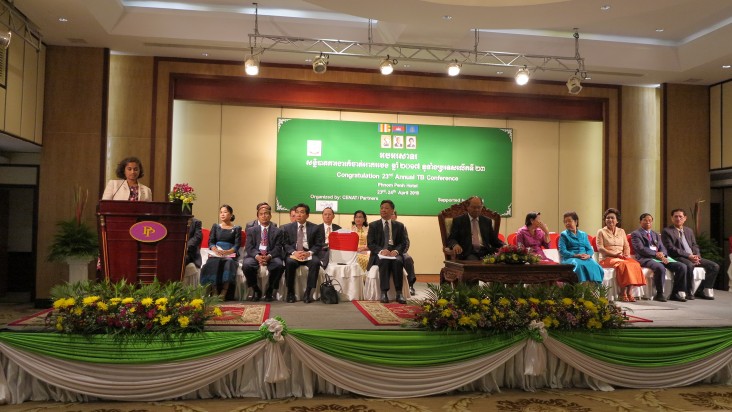Speeches Shim

(as prepared for delivery)
- Your Excellency, Dr. Mam Bunheng, Minister of Health
- Your Excellency, Dr. Mao Tan Eang, Director of CENAT and Advisor to the Ministry of Health
- Dr. Liu Yunguo, WHO Representative
- Distinguished Guests, Ladies and Gentlemen
On behalf of USAID, it is a pleasure to be here with you today.
There has been important progress made in fighting TB in the last two decades, both globally and here in Cambodia, and I want to congratulate the Ministry and the National TB Program on that success.
But globally TB remains a major problem, as the top infectious disease killer worldwide. Every year, over 10 million people are infected, and nearly 2 million lose their lives to TB. For over 4 million of the people who fall ill, their illness goes undiagnosed or without proper treatment and care. This suffering can be prevented and is an unnecessary loss of productivity for Cambodia. Leaving 40 percent of TB cases undetected can lead to drug-resistant forms of TB. Those strains are expensive to treat and subject patients to toxic drugs with increased potential for side effects. For patients paying out of pocket for their treatment, the high cost of medication can lead to catastrophic expenditures.
Despite great achievements, Cambodia still falls among the thirty high burden TB countries, as defined by the WHO. Around 20,000 TB cases were misdiagnosed in the past three years. Cambodia has narrowed the gap on missing TB cases significantly since 2000, but over a third of the estimated total cases are still going “missing” and undetected. If we are going to stop TB in Cambodia by 2035, this disease still demands a great deal of resources and attention.
To reach that goal – and we have fewer than 20 years left to do it – we need to sustain the momentum of the past two decades and we need to ensure that the quality improvements that have been achieved are maintained long into the future. Every one of us in this room should critically consider whether current TB interventions are effective and fit Cambodia’s needs today.
At USAID, we are continuously seeking to make good investments with our resources, and to invest in solid development achievements that we can hand over to the partner country when it comes time to shift our role. So my concern is sustainability. The USAID Administrator, Ambassador Mark Green, reminds us that the purpose of development assistance is to end its need for existence. We are partners on Cambodia’s journey to self-reliance. That is why we constantly ask ourselves: are the current interventions and activities effective? How will they be paid for in the future? Can the activities currently being conducted be integrated into the overall healthcare system? How can we ensure they will continue to be resourced and maintain high quality and effectiveness?
With 60 percent of all the money spent on health coming from Cambodians’ own pockets…we must ask ourselves how TB services will be funded. Is there potential for social health protection and insurance schemes to cover TB treatment and services? How can we ensure that patients are diagnosed, TB is treated, and people don’t incur heavy financial costs?
Answering these questions requires a lot of thought, planning, commitment, collaboration, and - most importantly - leadership. Looking at this group of leaders and experts today, I hope that we can use this opportunity to make a difference. To learn from each other, to identify the challenges, to find the solutions, and to help answer these questions.
I want to take a moment to congratulate the Royal Government of Cambodia on the progress made so far. The Ministry of Economy and Finance and the Ministry of Health, in particular, have made real commitments and taken action to mobilize Cambodia’s public resources to cover the cost of all contract TB staff and to procure first-line TB drugs. This commitment includes a pledge to increase investments over time such that the Royal Government will pay the full cost of first-line TB drug procurement by 2020. Finally, let me note that the MEF has recently taken on the role of Principal Recipient under the new Global Fund grant for 2018 to 2020, which sets a good foundation for the future financing of health programs. This is truly progress on the journey to self-reliance.
USAID is proud to be a part of the effort in Cambodia, and we stand ready to work together with the Royal Government to help stop TB by 2035.
Thank you again for inviting me to speak today. I look forward to hearing about the achievements of the conference and what is planned to sustainably combat TB.
Soam awkun!
Related Speeches
- Remarks by Menglim Kim, Project Management Specialist, USAID/Cambodia, USAID Greening Prey Lang Final Youth Debate
- Remarks by Ms. Hanh Nguyen, Deputy Mission Director USAID/Cambodia, Health Professional Councils’ Strategic Planning Orientation Workshop
- Remarks by John Eyres, Director, Office of Public Health and Education, USAID/Cambodia, Dissemination Workshop of the Fifth National Strategic Plan for a Comprehensive & Multi-sectoral Response to HIV & AIDS in Cambodia

Comment
Make a general inquiry or suggest an improvement.